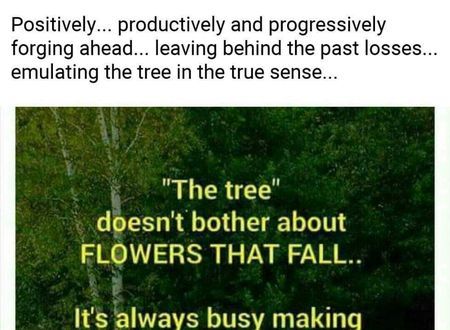I was 14-years-old when Prof. Sharma made me read As You Like It by Shakespeare. He knew most of it by heart. In fact, he knew pretty much all the works of Shakespeare and most of Robert Frost’s by heart. And there was this one quote, rather famous, that stayed with me. Prof. Sharma did explain it to me, though at the time, while I understood the meaning, I did not have the appreciation for it, “Sweet are the uses of adversity…” 1 How could adversity be sweet, I thought. It’s the last thing we want. In fact, if I was asked to sum up all human actions in four words, it would be: seek pleasure, avoid pain. Of all the pains, the most agonizing is the pain caused by a loss.
Loss is painful. We don’t want it that way, but it is.
The degree of pain may differ from one person to another, one loss to another, it remains painful, nevertheless. But, I have observed that there’s something even more powerful and painful than the loss itself. Know what it is?
Anticipation. The anticipation of loss is often more torturous than the loss itself. For, once we have already lost something, we dig deeper into our reserves of resilience, skill, faith and creativity to come out of it.
But, when we know that our loss is imminent, that we are about to lose something dear to us, it brings us anxiety, it gives us pain, it makes us feel low. We question everything. It throws us into uncharted waters, our reactions are unpredictable. Just look around and you will see that a majority of the breakups are not “amicable”. We tend to take things personally and the more personally I’ll take something, the greater the hurt.
Even for a moment I’m not suggesting that it’s wrong to take things personally. Who am I to judge? Besides, it’s natural to take the matter to heart when you’ve invested your emotions, energy and resources into something over a period of time. Having said that, the truth, however, remains: more attachment brings greater pain. Are we then to say that there’s no way of avoiding this pain? Well, there is. Complete avoidance, maybe not, a great reduction, yes.
How, you ask?
Let me share with you a story from Happiness by Matthieu Ricard. Verbatim:
A long time ago, the son of a king of Persia was raised alongside the son of the grand vizier, and their friendship was legendary. When the prince ascended to the throne, he said to his friend: “While I attend to the affairs of the kingdom, will you please write me a history of men and the world, so that I can draw the necessary lessons from it and thus know the proper way to act.” The king’s friend consulted with the most famous historians, the most learned scholars, and the most respected sages. Five years later he presented himself proudly at the palace.
“Sire,” he said, “here are thirty-six volumes relating the entire history of the world from creation to your accession.” “Thirty-six volumes!” cried the king. “How will I ever have time to read them? I have so much work administering my kingdom and seeing to my two hundred queens. Please, friend, condense your history.”
Two years later, the friend returned to the palace with ten volumes. But the king was at war against the neighboring monarch. He was found on a mountaintop in the desert, directing the battle. “The fate of our kingdom is being played out as we speak. Where would I find the time to read ten volumes? Abridge your history even further.”
The vizier’s son left and worked three years on a single volume that gave an accurate picture of the essence. The king was now caught up in legislating. “How lucky you are to have the time to write quietly. While you’ve been doing that, I’ve been debating taxes and their collection. Bring me tenfold fewer pages — I’ll spend an evening mining them.”
Two years later, it was done. But when the friend returned, he found the king bedridden, in dreadful pain. The friend himself was no longer young; his wrinkled face was haloed by a mane of white hair. “Well?” whispered the king with his dying breath. “The history of men?”
His friend gazed steadily at him and, as the king was about to die, he said: “They suffer, Majesty.”
Pain and suffering are an integral part of our existence. It’s the eternal truth. But, that’s not to say this truth has to ruin our peace and quality of life. We don’t suffer because we have to, we suffer because we choose to. I know it sounds harsh but while pain is a fact of life, suffering is our interpretation of it. We may not have a choice when it comes to pain, but our suffering is dependent on our view of life and our expectations from the world around us. Change your perspective and life changes. Reduce your expectations and experience profound transformation.
One definitive way to reduce pain is to have a rich inner life. A fulfilling inner life means more happiness, calmness and joy. People with rich inner lives are stronger and more secure. They make better partners, leaders and citizens. Naturally, the question then arises how to have a better inner life? It begins by asking three important questions:
1. Am I content? (If not, what do I think I need to be content?)
2. Am I honest? (If not, no wonder I’m not content. Honesty in action, speech and thought.)
3. Am I kind? (Between givers and takers, the givers always enjoy a richer inner life).
Contemplate these three and you will soon find your inner voice guiding you.
And you know, how they say that pain is inevitable but suffering is optional? I think pain is not only inevitable, it’s necessary. Indeed, it’s absolutely required for our emotional and spiritual growth. It pushes us out of our comfort zone and thrusts us into focused action. Once you are past the anxiety, sorrow and bitterness brought upon by pain, you find yourself stronger and wiser.
Focus on your inner life and the outer one aligns itself. Our mind is the steering wheel. The engine maybe roaring, the chassis strong, the body aerodynamic, and the torque immense. Still, the wheels only turn in the direction of steering.
Mulla Nasrudin approached a beautiful woman in a very crowded bazaar. “Excuse me,” he said, “I’ve lost my wife here in this market. Can you talk to me for a couple of minutes?”
“Why?” the young woman asked, puzzled.
“Because every time I talk to a beautiful woman, my wife appears out of nowhere.”
Every time we speak to our unrealistic expectations and negative thoughts, pain and suffering appear out of nowhere. Yes, loss is painful, but can you name even one thing you can have forever? The truth is everything we have is subject to loss. It’s the fine print of life.
Peace.
Swami
P.S. A big thank you to those who have been writing quality posts on os.me. In just one week, you’ve taken this platform to a new level.
Notes
A GOOD STORY
There were four members in a household. Everybody, Somebody, Anybody and Nobody. A bill was overdue. Everybody thought Somebody would do it. Anybody could have done it but Nobody did it.
Don't leave empty-handed, consider contributing.It's a good thing to do today.









Comments & Discussion
107 COMMENTS
Please login to read members' comments and participate in the discussion.